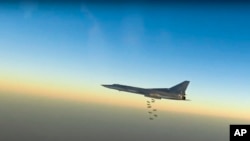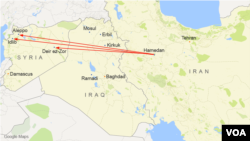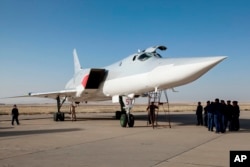Russian warplanes flew from Iran to carry out airstrikes in Syria for a second day Wednesday.
The Russian Defense Ministry said the strikes originating from Hamedan airbase targeted Islamic State militants. The first round of airstrikes Tuesday were aimed at Islamic State as well as the jihadist group Jabhat Fateh al-Sham, formerly known as al-Nusra Front.
Foreign Minister Sergei Lavrov rejected a U.S. State Department spokesman's assertion that the flights could amount to a violation of a U.N. Security Council resolution banning the sale or transfer of combat aircraft to Iran.
The speaker of Iran's parliament Ali Larijani also stressed Wednesday that Iran has not given Russia a permanent base in its territory.
Important new development
Russia has been conducting airstrikes in support of President Bashar al-Assad's government since September of last year, but until this week the flights have originated from either Syria or Russia itself.
Alex Vatanka, a senior fellow at the Middle East Institute and the Jamestown Foundation, said the new flights mark an important development.
“I cannot remember any other state since 1979 having been given basing permission by Iran. It brings Russia into Iran like we have not seen before," Vatanka said. "The official line is that it provides Russia with a backup option and less anxiety about potential anti-air missiles in the hands of the Syrian rebels that can target Russian assets based inside Syria. But as I said, it is a bigger story than just that. Russia is moving closer to the warm waters of the Persian Gulf.”
Flying from Hamedan airbase instead of Russia's base at Mozdoko in the north Caucasus cuts the distance from nearly 2,000 kilometers to less than 700 kilometers.
The chief of the Russian Federation Council's defense committee, Viktor Ozerov, said the shorter flying distance would increase the accuracy of Russia's airstrikes and allow pilots to avoid advanced ground-to-air missiles in the Syrian rebels' arsenals.
Some see other motives in Russia's move.
“Placing Tupolev Tu-22M3 bombers in Hamedan certainly shortens the distance,” said Blake Fleisher, a policy analyst with the Jewish Institute for National Security Affairs. “But it’s hard to believe that shortening the distance is the only reason.”
Increased influence
Analyst Martin Reardon of The Soufan Group said Russia is accomplishing two things by boosting its influence and role in the Middle East.
"It shows the world that they are in fact a re-emerging global power," the former senior FBI official said. "It also offsets U.S. efforts moving back toward the Cold War era when the U.S. and Russia were playing against each other for influence."
In January, Russia and Iran signed a military cooperation deal for wider collaboration in training and counterterrorism activities.
“Russians proposed this idea [a] few months ago and it was discussed with the Iranian authorities back in December 2015,” said Babak Taghvai, a Russian military expert based in Malta. “But due to unknown reasons, it was rejected until this July.”
Kapil Komireddi, an international affairs analyst based in Britain, said the latest developments are "a clear message to Washington that all decisions are not necessarily made in [the] White House. ... An alliance with Moscow, and letting the Russians use its bases, is a clear message from Tehran that it will do whatever it takes to serve its interests in the region.”






